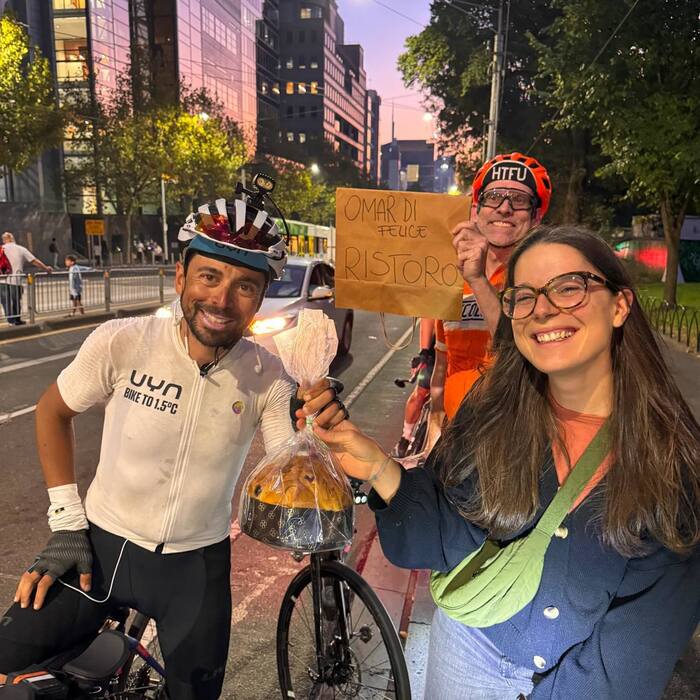Enlarge image
Orthopedic shoe technician Karl-Heinz Schott (second from right) with his team in Sydney: »My home is here now«
Photo: shoetech
“Everyone in Australia only knows me as Karl.
Actually, my name is Karl-Heinz, like my father.
If I had stayed in Hessen, I would probably have been approached as a junior until my 50th birthday.
My great-grandfather was already a shoemaker. I was supposed to run the family business in the fourth generation, and I wanted to do that too. I had fun doing the orthopedic shoe technician apprenticeship, I graduated from my master's degree in 1987 and was highly motivated. Then I saw the job offer in Japan: they were looking for an orthopedic shoe technician to train colleagues there. A job far away in a completely different environment - I thought that was great. My father would probably continue to work for two more years, I thought at the time. So that's how long I would have time to travel.
I liked Japan a lot, and teaching even better.
I used my free time to see Australia.
I didn't feel like doing the classic backpacker jobs as a harvest worker or waiter;
I would rather work in my job.
And so I traveled to all the shoe factories in the country to present my orthopedic shoes.
Back then, at the end of the 1980s, Australia still had protective tariffs on the import of shoes in order to strengthen the domestic industry.
But it was clear that these tariffs would soon be abolished, and orthopedic shoes seemed to me to be a niche in the market.
Many insoles or wedges do not fit well in traditional shoes and there were few alternatives in Australia.
I was warmly welcomed in the factories, but I couldn't really get anyone excited about the idea.
After all, I was able to sell enough shoes to finance my trip.
After two years in Japan, I had to decide what to do next.
The Japanese company wanted to keep me as an employee, but I got the impression that as an immigrant you can have a very good life in Japan, but you will remain the outsider forever.
I also wanted to take over the family business in Homberg.
But my father never thought of quitting.
I had so many ideas, so much zest for action.
Two in the workshop, that would not have gone well for long.
I wanted to do my own thing.
And so I negotiated a deal with the Japanese company: I would continue to work for them as a consultant, but only on a monthly basis.
And the rest of the year I would live in Sydney and build something there.
Getting an Australian visa was much easier over 30 years ago than it is today.
The required English test then only consisted of a short phone call.
It is much more difficult for young professionals in Australia today.
The bureaucracy has tightened, rents have become incredibly expensive.
But there have also been many positive changes: In my first year here in Sydney I became a tea drinker because the coffee that was served was so bad.
Today, Australia is considered a coffee lover's paradise.
The range of food on offer has also increased enormously and there is now a lot more on offer in terms of culture.
Back then I was specifically looking for the perfect place to live for me and decided on Dee Why, a suburb in the north of Sydney.
The opera house can be reached by car in half an hour, there are two picturesque beaches and lots of nature.
I still like it there today.
In the early years I lived in shared apartments, at times I was even on the go as a couch surfer to save money. I set up my workshop in a garage five minutes from the beach. A friend from Homberg was completely horrified when he visited: It looks like a hole in the ground.
In fact, there were worlds between my old life in Hesse and the new one in Australia.
In Homberg I drove to the master’s school in the BMW, in Sydney I was happy to get hold of a ten-year-old junk car.
But I didn't mind living frugally.
On the contrary: it helped me integrate.
In the shared apartments I got to know so many different people and thus so many different perspectives.
I am still convinced today that having little money at a young age is also good.
Anyone who learns to make ends meet with little will develop enormously personally.
The nice thing about my job: You can feel the success
During this time it became clear to me that if I want to advance professionally in Australia, I first have to gain acceptance for my industry. There were a handful of orthopedic shoemakers in Australia, but the profession was barely recognized. Cooperation with health insurance companies or doctors turned out to be difficult, and only the complicated cases came as customers, for example people whose foot had already been partially amputated. Sensible shoes can reduce the risk of foot amputation, especially in the case of diabetics. But what doctor wants to send a patient to someone he doesn't even know?
I first had to earn the trust of doctors and patients, but also that of my colleagues.
The nice thing about my job, however, is that you can feel the success of my work.
Those who are satisfied with their contribution come back and tell others about it.
One of my most loyal clients is actor Russell Crowe.
A film production company had ordered shoes from me for him to wear when shooting.
And apparently he liked my work.
He's been my customer for 15 years now and even buys his custom-made flip-flops from my brother Markus in Homberg - with an insole integrated into the sole.
Orthopedic flip-flops as a business idea
When my little brother announced that he would take over my parents' shop, it was a load off my heart.
By the time my father wanted to give up the company, I was already firmly rooted in Sydney.
I didn't want to go back.
But it would have been difficult for me to bury the family business too.
And then my brother came up with the idea of orthopedic flip-flops while visiting me.
At that time, a professional surfer with foot problems came into my shop.
I wanted to sell him some insoles, but he didn't know what to do with them.
As a surfer, he almost never wore sturdy shoes.
My little brother and I started tinkering and the result was so convincing that Markus now employs 25 people in Homberg who manufacture orthopedic flip-flops for people from all over the world. However, I tend to sell a few of them myself. I'm not a good marketer, more of the professional politician type.
For three years I was President of the International Association of Orthopedic Shoemakers and, as the latter, also an envoy to the World Health Organization. I fought to ensure that there are now fixed qualification requirements for orthopedic shoemakers in Australia and, together with Southern Cross University (SCU), even created our own bachelor's degree for our youngsters. I wrote the content of the course myself. I now teach part-time as a university lecturer, have contributed to several scientific publications and work in research. That would be unthinkable in Germany - I would at most deliver the insoles for the studies.
In everyday life, too, I now have a lot more creative freedom than my colleagues in Germany: Doctors send me their patients, and after a foot examination I decide for myself how best to help whom.
Financially, I'm probably no worse off now than if I had stayed in Homberg.
I own a macadamia farm south of Sydney that I have leased.
Few people know that macadamia nuts originally come from this area.
That was important to me, I don't want to grow anything that doesn't actually belong here.
I like to prowl among the trees on my farm.
My family in Hessen also had agriculture, which I had missed in Australia.
I dream of an organic farm, but so far the neighbor to whom I have leased the land is not yet convinced of organic farming.
But I know that: if you want to change something, you need patience and proceed cautiously.
I don't actually want to work until the official retirement age of 67, I'm already looking for possible successors for my business and have bought an apartment on the Gold Coast, so my wife and I want to move there when we retire.
I could well imagine spending some time in Germany again.
The last time I sat on the market square in Homberg, I was completely enchanted.
I had exactly this magical feeling that I had 35 years ago when I was in Sydney at Curl Curl Beach for the first time.
But I will certainly not move back to Germany completely.
My home is here now. "














